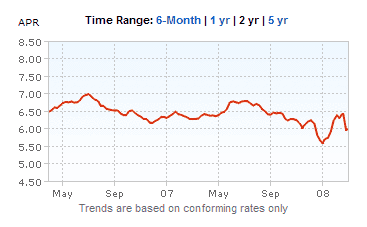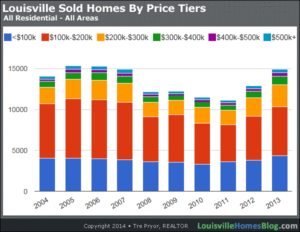Here is the most popular question I receive these days. “Is now a good time to buy or not?”
That’s a great question! The answer? It depends. “Well, thanks a lot, that really clears things up for me.”
I know, I know, it can be confusing, but let me shed a little light on the topic with a few examples.
First, mortgage rates vary by location, by credit rating and also fluctuate on an hourly basis. But if you take a look at some 30-year fixed rates in Kentucky over the past 2 years, you’ll note we’re currently in a pretty desirable position.

“Ok Mr. Pryor, but rates are just part of the story. What about me not being able to get as much on the sale of my current home?” Another great question! Here’s a great example from a recent Time article called Ignore the Headlines.
But let’s say you are emotionally ready to be a homeowner. You have good credit, plan to stay put for five years and have been waiting for the perfect entry point. It’s time to get serious–before an inevitable rise in interest rates wipes out your advantage. “The thing that will make home prices stop falling is the very same thing that will push mortgage rates higher,” says Jim Svinth, chief economist at mortgage firm Lending Tree. So anything you gain by a further drop in prices might be offset by rising financing costs.
Consider a typical home that sells for $218,900. You put down 20% and get a 30-year fixed-rate mortgage at today’s rate of 5.5%. Monthly principal and interest come to $994.31. Let’s say that 12 months from now the same house goes for 10% less, or $197,010. But by then the recession is history and the Fed is jacking up rates to stem inflation. If mortgage costs rise a point, to 6.5%, your monthly payment would be $994.94 and you’d have saved nothing. Meanwhile, home prices might steady and sellers might become less willing to negotiate. And you have spent a year living someplace you’d rather not be.
In this example, the change in rate completely wiped out any gain the homeowner might have received at the price of the house. With rates currently at their lowest since 2004, it’s not unreasonable to expect them to rise in the future.
Here’s another part of the equation. Home values here in Louisville have held their own much better than most similarly sized cities in our part of the country.
Nashville-Davidson–Murfreesboro–Franklin, TN – 34.80%
Source: MSN
Louisville-Jefferson County, KY-IN – 20.68%
Atlanta-Sandy Springs-Marietta, GA – 19.43%
Memphis, TN-MS-AR – 18.47%
Cincinnati-Middletown, OH-KY-IN – 15.22%
Columbus, OH – 13.49%
Indianapolis-Carmel, IN – 11.95%
As you can see, only Nashville is outperforming Louisville in home appreciation. Everything in life is cyclical. Values and rates will rise and fall everywhere. But here in Louisville, those increases and decreases are simply just smaller.
The last part of the puzzle is your particular plan. Are you moving from a more expensive home to a less expensive home? Given that Louisville’s housing market has a large amount of inventory, buyers are generally getting good deals. If you want to put a number to this “good deal”, let’s use 4%. When you take 4% of a $300,000 property ($12,000), it’s obviously greater than 4% of a $190,000 property ($7,600) so the good deal you’ll get on your new, less expensive house won’t make up for the amount you’ll be losing in the sale of your current home. (Keep in mind this is a simplified example, so your experience may be quite different. The interest rates on both your current and new mortgage factor in, as well.)
But if you’re moving from a less expensive home to a more expensive home, the reverse is true—therefore, it certainly is a good time to make a move. Especially if you can do so before rates increase.
Hopefully, I’ve done a decent job of explaining this complicated issue. As always, if you have any questions, please feel free to contact me. I’m here to help!



